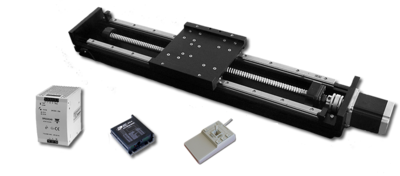How to choose servo motors and drives
Choosing suitable servo components for a linear motion machine is straightforward process. This article gives a method for choosing suitable servo motors and drives for a machine with linear axis, such as CNC, 3D printing or pick'n'place systems.
Contents
Defining goals[edit | edit source]
The first step is to define goals of the system. Find numbers to the following questions:
- How much is the required linear force?
- How much is the maximum desired speed?
- What is the required accuracy (resolution, precision, repeatability)?
- What is the required stiffness / nature of mechanical load (stationary/vibrating)?
Choosing electromechanical parts[edit | edit source]
Choosing linear guides[edit | edit source]
Selection of linear guides have different choices to match desired speed range, stiffness, precision and cost. The following table summarizes most common choices with pros and cons:
| Type | Cost | Precision | Stiffness | Speed capability |
|---|---|---|---|---|
| Round linear bearing (sliding) | Low | Low | Low/moderate | Medium/high |
| Round linear bearing (ball) | Low/medium | Medium | Medium (Supported only at end points) | Medium |
| Track linear guide | Medium/high | High | High (Supported from whole length) | Medium |
| Dovetail | Low/medium | Medium/high | Medium/High | Low |
| Roller | Low/medium | Medium | Medium | High |
Choosing rotary-to-linear transmission[edit | edit source]
A typical solution to produce linear motion from rotary motor is to use a lead screw. There are mainly two kinds of lead screws: trapezoidal (sliding) and ball screw. Another common solution is to use belt or rack and pinion system.
| Type | Cost | Precision | Stiffness | Speed capability |
|---|---|---|---|---|
| Trapezoidal screw | Low | Low | Low/medium | Medium |
| Ball screw (rolled) | Medium | Medium | High | Medium |
| Ball screw (ground) | High | High | High | Medium |
| Timing belt | Low | Low | Low | High |
| Rack and pinion | Low | Low | Low | High |
Transmission ratio and it's effect to performance[edit | edit source]
The resolution of transmission comes mainly from the transmission ratio: how much linear motion is produced per one revolution of motor (i.e. pitch of lead screw). Typical screw transmissions are between 2 mm/turn to 10 mm/turn while typical timing belt or rack & pinion systems have ratio of 20 to 100 mm per turn.
Higher ratio leads to higher speed capability but same time reduces stiffness, linear force and precision and vice versa.
Choosing motor[edit | edit source]
Choosing motor drive[edit | edit source]
In no event the Product Information or parts hereof shall be regarded as guarantee of conditions or characteristics. The Product Information or any part thereof may also not be regarded as a warranty of any kind. No liability of any kind shall be assumed by Author with respect to Product Information or any use made by you thereof, nor shall Author indemnify you against or be liable for any third party claims with respect to such information or any use thereof.
As content of this Wiki may be edited by user community, Granite Devices Oy or it's affiliates do not take any responsibility of the contents of this Wiki. Use information at your own risk. However, Granite Devices staff attempts to review all changes made to this Wiki and keep information trustworthy.
Without written consent, Granite Devices' Products or Intellectual Property shall not be used in situations or installations where living beings, material property, or immaterial property could be harmed by the operation, features or failures of Product. Products may only be used in a way where hazards like moving parts, electric shock, laser radiation, or fire can't be realized even if the content of this Wiki would suggest otherwise.
